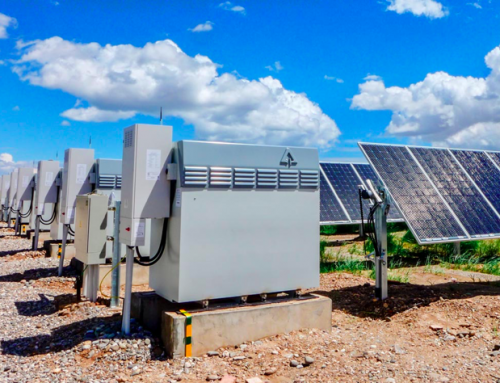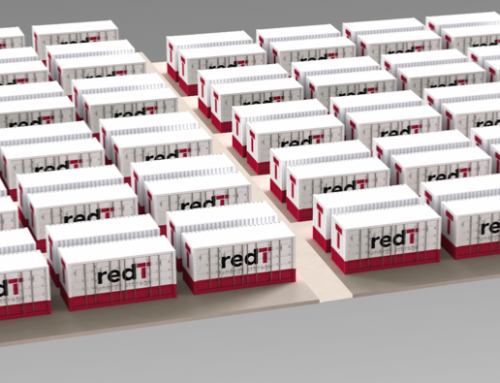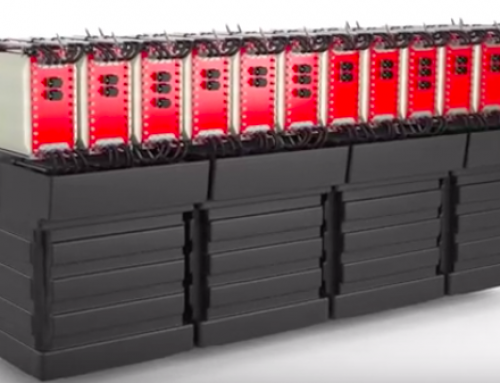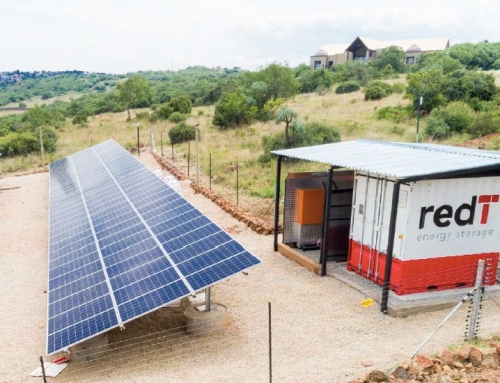By Julian Singer
At the end of June Invinity Energy Systems, the manufacturer of vanadium flow batteries (VFBs) for electricity storage, announced its results for 2021. They show a sharp increase in revenue, up from £0.7million in 2019, £0.2m in 2020 to £3.2m in 2021. As explained by CEO Larry Zulch, much of the revenue for 2021 was the result of orders placed in 2020, but this is still a significant breakthrough.
Between January 2021 and the announcement of results Invinity sold batteries able to produce 9.34 MWh of energy. Of this 5 MWh was installed at the Energy Superhub Oxford, one of three publicly funded demonstrator systems that are intended to show how smart local energy systems can reduce carbon emissions. A further 1.8MWh was delivered to the European Marine Energy Centre in Orkney while other systems were delivered in Scotland, California and elsewhere.

Solar panels and Invinity’s flow batteries (in white boxes at rear) power one of Scottish Water’s waste water treatment plant
As of 25 May 2022 Invinity states that it has 28 MWh of battery that are already delivered or in the process of delivery, a further 11.6MWh where prices have been agreed and contracts in process and 66.3MWh on projects that are on the way and for which the company has been selected as the battery supplier.
These numbers are in the right direction, but they still pale in comparison to the amount of energy storage provided by lithium-ion batteries. The first big storage battery, Tesla’s Hornsdale project in South Australia in 2017, could initially store 129MWh and has since been expanded to store 189MWh. This reflects a general preference to depend on lithium because it is a known quantity, seen to be cheaper and apparently readily available.
However, in the longer run the demands of electric vehicles and the rising price of lithium, cobalt and other needed elements makes it essential to find an alternative for storage. In the UK the DBEIS has recognised this by launching the Longer Duration Energy Storage (LODES) competition. Part of this aims to promote full commercialisation of existing systems. Alongside four others Invinity will receive £0.7m to develop complete plans for a 40MWh battery co-located with solar generation (including front-end engineering design, supply chains, grid connection and finance). Next year three of the systems will be chosen to go ahead.
There is still the question of cost. Matt Harper, Chief Commercial Officer, says that “The initial cost of purchasing one of Invinity’s VFBs is typically more than an equivalent lithium battery. However, customers tell us that the additional safety and siting costs required for lithium often bring us to cost parity, especially on projects under 2 MWh.” The comment on safety refers to the possibility that a lithium battery will spontaneously ignite. The chances of one battery igniting are small but with the very large numbers involved in a storage system the chance is not negligible. South Korea was the largest storage market in 2018 but a large number of fires has reduced growth.
In addition VFBs are not the only alternative to lithium. Another section of the LODES competition concerns 10 prototype systems using different technologies, and this by no means covers all possible techniques being developed. The sector is wide open, but flow batteries are further advanced than any other lithium alternative. At a workshop on long-duration non-lithium storage held by the California Energy Commission, Mr Zulch noted that he was the only presenter with a working product in the field.
Last year may have been a breakthrough year for revenue, but on profit the story was very much the same. In 2020 the company recorded a loss of £24m while in 2021 the loss was £21m. Of particular concern is the cost of sales in 2022, which at £6.6m is more than twice the revenue. Peter Dixon-Clarke, the CFO, blames this on high global input and shipping prices. This, clearly, cannot continue.
Yesterday the share price stood at 37 pence, close to its all-time low since the company was formed in April 2020 from UK-based RedT and the Canada-based Avalon.





